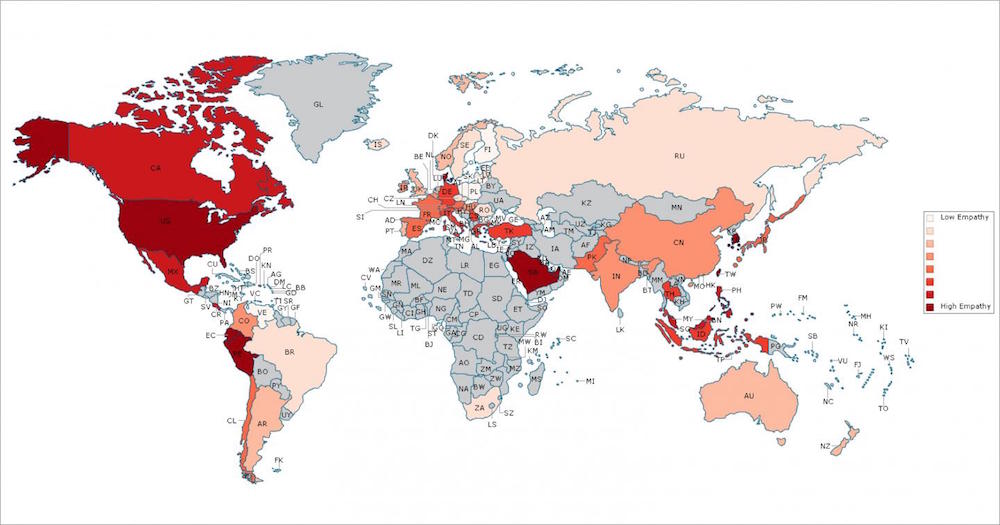The Most and Least Empathetic Countries in the World

Which countries are the most empathetic? According to the results of a new survey, people in Ecuador reported having the most empathy, while people in Lithuania reported having the least.
But the United States still ranked in the top 10, coming in seventh on the list.
Following Ecuador, the next most empathetic countries were Saudi Arabia, Peru, Denmark, the United Arab Emirates (UAE), Korea, the United States, Taiwan, Costa Rica and Kuwait, according to the study. Following Lithuania, the next least-empathetic countries were Venezuela, Estonia, Poland and Bulgaria. [See a Full List of Empathy Rankings for 63 Countries]
To come up with the rankings, the researchers gave online surveys to 104,365 adults from 63 countries. The participants answered questions about their empathy — their ability to react to and connect with others both emotionally and intellectually — as well as other traits.

American empathy

The United States' place in the top 10 isn't bad, said the study's lead researcher, William Chopik, an assistant professor of psychology at Michigan State University. The psychological state of Americans has undergone a transformation in recent decades, which has led to a larger focus on the individual and less on others, he said.
"These changes might ultimately cause us to leave our close relationships behind," Chopik said in a statement. "People are struggling more than ever to form meaningful close relationships. So, sure, the United States is seventh on the list, but we could see that position rise or fall depending on how our society changes in the next 20 [to] 50 years."
In fact, past research has indicated a decrease in empathy among American college students. That research, carried out by two of the new study's co-authors — Ed O'Brien, an assistant professor of behavioral science at the University of Chicago, and Sara Konrath, an assistant professor of philanthropic studies at Indiana University — showed a decrease in empathy during the 20-year period of 1979 to 2009. The pair, who worked with another college on this meta-analysis, detailed the review in 2011 in the journal Personality and Social Psychology Review.
Sign up for the Live Science daily newsletter now
Get the world’s most fascinating discoveries delivered straight to your inbox.
How empathetic are you?
To learn about empathy levels around the world, Chopik and his colleagues asked survey participants to rate their empathy — that is, how "psychologically in tune with others' feelings and perspectives" they were, according to the study. For instance, participants were asked to rate the questions, "I often have tender, concerned feelings for people less fortunate than me," and "I sometimes try to understand my friends better by imagining how things look from their perspective," on a scale of 1 ("doesn't describe me well") to 5 ("describes me very well").
Countries with fewer than 20 respondents were excluded. About 75 percent of the total respondents reported that they lived in the United States, meaning that some countries had small sample sizes. Ecuador, for instance, had 39 respondents, and Lithuania had 32.
Moreover, the survey only had an English version, even for nonnative speakers. Previous research has indicated that nonnative English speakers tend to answer like English speakers when administered surveys in English, so it's possible that the current study underestimated the variation of empathy across cultures, the researchers said in the study. [5 Ways to Foster Self-Compassion in Your Child]
It was surprising that three of the most empathetic countries — Saudi Arabia, UAE and Kuwait — were in the Middle East, considering the long history of aggression and wars in that region, Chopik said. Perhaps these countries achieved top rankings because the study did not distinguish between feeling empathy toward people in other countries versus empathy toward people in one's own country, he said.
He also noted that seven of the top 10 least-empathetic countries were in eastern Europe.
Moreover, countries with higher reported levels of empathy also had higher levels of collectivism (when a person prioritizes a group over an individual), agreeableness, conscientiousness, self-esteem, emotionality (how much a person experiences and expresses emotions), subjective well-being and prosocial behavior, the researchers found.
Because this new worldwide study is simply a snapshot in time, it's likely that each country has fluctuating levels of empathy depending on the year, Chopik said.
"This is particularly true of the United States, which has experienced really large changes in things like parenting practices and values," he said. "People may portray the United States as this empathetic and generous giant, but that might be changing."
The study was published online Oct. 14 in the Journal of Cross-Cultural Psychology.
Original article on Live Science.

Laura is the archaeology and Life's Little Mysteries editor at Live Science. She also reports on general science, including paleontology. Her work has appeared in The New York Times, Scholastic, Popular Science and Spectrum, a site on autism research. She has won multiple awards from the Society of Professional Journalists and the Washington Newspaper Publishers Association for her reporting at a weekly newspaper near Seattle. Laura holds a bachelor's degree in English literature and psychology from Washington University in St. Louis and a master's degree in science writing from NYU.









